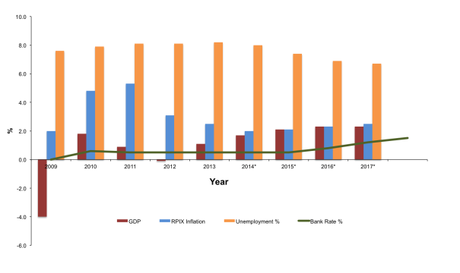How did the global financial crisis result in large government sector cuts?
The events of 2007 are very well documented. There has been a plethora of texts published, journal articles, books, magazine articles etc. dedicated to covering the horrific downturn of several leading financial markets in 2007. The crash ensured that several billions worth of Sterling, Dollars, Yen and so on were given to numerous financial institutions for some were deemed “too big to fail.” The term “too big to fail” is theoretically questionable to say the least, a point I shall discuss further as this piece develops. What was clear about the government bailouts, particularly in the UK was the fact that institutions such as Northern Rock (now Virgin Money) and RBS would have collapsed had the government chosen to ignore their pleas and let them fail. It is worth remembering that between 1995-2006 was a period of unfettered market capitalism. A period where credit was “pumped” into the economy, a period that was unique.

Stock crash
The austerity policies have been discussed in some depth on this blog, my pieces here and here are pieces I wrote discussing certain facets about government policy and how they may be making the flat and unresponsive economy worse. The UK (much like the rest of the areas affected heavily by the global banking crash) have adopted a set of rigid public sector cuts, designed to reduce the large dependency on government for goods and services and also because the current government deem the current debt-to-GDP too high. (86%)
If one were to assess austerity in the UK so far could anyone deem the set of policies a success? Of course, the government intends for their policies to have much longer effects, a legacy effect if you will, but that should not come at the peril of current generations, for the government should dictate policy for both now and the future. Moreover, economists such as Stiglitz, Krugman, Solow, Diamond, Sharpe, Skidelsky and several others all warned against excessive fiscal cuts. There is no empirical evidence of any large economy cutting its way to prosperity. Yet what could easily be described as a gamble or the set of ideologically driven policies have ensured that in the UK and much of the developed world have had their economies remain flat since 2011, having slumped from 2009-2011.
In 2009 the rhetoric around fiscal policy changed. If you go back to Tony Blair’s premiership I do not remember anybody on either side of the House quibbling about government spending, in fact the opposite. The then Shadow Chancellor of the Exchequer George Osborne stated that he would match Labour’s spending. Spending he would later tirade about once he became Chancellor. Moreover, Labour made several economic mistakes one of them was the heavy deregulation of the financial markets that actually allowed a steady and then volatile flow of cheap and available credit to flood the economy. Too many people binged on cheap and available credit and several institutions capitalised on this and were making substantial profits as a result. Making profits is part of our societal fabric and that is not my issue, but in the business world, if a firm does not make profit, eventually that business is driven out and replaced by one that will. This to me that is the essence of capitalism. Why then was RBS, Northern Rock or Lloyds bailed out? Okay, anybody with an account with those firms would have lost their money, which is very unfortunate, but in a market economy, an economy where proponents of free-market capitalism constantly bombard against government interference, where more than happy to accept taxpayers money. Some clarity would be great because these are the same institutions that support, lobby and advocate for laissez faire policies yet accept the ultimate form of government intervention. This anomaly still baffles me and it is unfortunate that we are still paying the heavy price for the actions of a few financial institutions. Moreover it was the substantial bank bailouts, not excessive government expenditure that caused such a sharp rise in the high levels of public sector debt. Debt that is being tackled with austerity policies. Nothing should ever be “too big to fail” because that is the antithesis of a competitive free market, the kind of market that is encouraged in the UK. The government should have let the failing banks fail so other banks could learn that reckless and irrational behavior should not be tolerated. It would have been a message of biblical proportions. Without bailing the banks out we would not need austerity and six years and more of lost output. It appears that policy has not favoured the majority of the population who are still readjusting to the large structural changes that have taken place since 2009. The graph below is an economic outlook for the UK and makes for miserable reading.

Even with an extremely accommodative monetary policy in the sense that the interest rate has been 0.5% since March 2009 the government’s reluctance to deviate away from an ineffective set of policies is detrimental to the economy. Now is as good a time than ever to undergo strategic and logical investment programmes. Instead the large public sector cuts have actually been damaging to the government’s deficit reduction plan because unemployment is rising, therefore, transfer payments in the form of Job Seekers Allowances and Unemployment benefits have increased. If the government were to run public sector cuts with substantial investment programmes and run them simultaneously, shifting resources away from areas deemed to be wasting government funds and invest in areas with high returns this would be a better set of policies. Instead, we just have the negativity associated with public sector cuts, which has made the private sector less responsive as a result of the lack of economic activity.
It is impossible to cut your way out of a recession; nations need to invest wisely in order to grow. America pulled itself out of recession because their production levels in the late 1930s and early 1940s substantially boosted their economy. The point is, they invested. There was an economic crash and the government invested. The New Deal (America’s recovery plan) took several years to have a noticeable effect on the economy, but it was investment that helped aid their recovery.
The government’s gamble still has not paid off and the UK does not appear to be changing any time soon. Governments need to spend in order to get a return. Without it, our economy shall remain sluggish for some time and this is a direct result of the aftermath of the global banking crisis, not excessive government expenditure.


